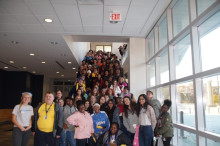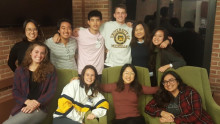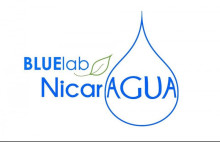Adrienne-Denise V Bilbao
Posts tagged with student mini grants in Blog Student Stories
Showing 21 - 24 of 24 items

STEM Society is a student organization that aims to expose K-12 students in lower socioeconomic areas to inquiry-based learning in science, technology, engineering and mathematics. We hope to displace common stereotypes that students may have about accessibility to STEM education and careers, as well as increase their awareness about the diverse opportunities available in these fields. In addition, we strive to provide our organization members with a chance to advance their interests in teaching and sharing their passion for STEM. Through presenting STEM in an engaging and interactive manner, we hope to broaden students’ knowledge, challenge any beliefs they may have about the inaccessibility of STEM, and spark excitement and passion for pursuing a STEM education. We also hope to promote diversity and inclusion in the STEM fields by reaching out to groups that have historically been underrepresented in higher education or STEM careers and showing them that if they have a passion for STEM and motivation to pursue it, that they belong in these fields as much as anybody else.

Project Alivio is a multidisciplinary global health project team that is a part of Michigan Health Engineered for All Lives (M-HEAL). Our goal is to reduce the incidence rate of pressure ulcers in San Juan de Dios hospital. What makes us unique as a project team is that our 19 students work as a co-design team with the Students Association of International Medical Research (SAIMER), a medical student organization from the Universidad de San Carlos in Guatemala City. As we design our solution, we are constantly receiving input from peers our age with more medical experience at our target location.
Pressure ulcers, or bedsores, form when a patient is exposed to pressure for a prolonged period of time. This pressure restricts proper blood flow to a certain area on the body, usually the coccyx, heels, back of head, or elbows, causing skin and tissue damage. To prevent pressure ulcers, nurses turn patients to offload the pressure exerted on the body. Pressure ulcers have high incidence rates in Guatemala City for many reasons, but the factor we are targeting is the understaffing of nurses.
Our team meets for several hours a week to design, build, discuss progress, and plan next steps. With the input of professors, physicians, and nurses from both universities, we hope to design a sustainable solution for our end-users. We also value offering our members a meaningful and educational project experience.
This spring, from April 29th to May 10th, seven of our members will be traveling to Antigua, Guatemala. In past, we have made two trips to Guatemala to conduct a needs assessment, which is how we narrowed the need to pressure ulcer prevention. This will be the first trip that is focused on the design itself. We will bring some sketches and prototypes of different concepts to show to our stakeholders to receive feedback. Besides the project itself, the trip will be a great opportunity for some of our newer members to learn more about the global health scene and feel connected to this project.
Pressure ulcers, or bedsores, form when a patient is exposed to pressure for a prolonged period of time. This pressure restricts proper blood flow to a certain area on the body, usually the coccyx, heels, back of head, or elbows, causing skin and tissue damage. To prevent pressure ulcers, nurses turn patients to offload the pressure exerted on the body. Pressure ulcers have high incidence rates in Guatemala City for many reasons, but the factor we are targeting is the understaffing of nurses.
Our team meets for several hours a week to design, build, discuss progress, and plan next steps. With the input of professors, physicians, and nurses from both universities, we hope to design a sustainable solution for our end-users. We also value offering our members a meaningful and educational project experience.
This spring, from April 29th to May 10th, seven of our members will be traveling to Antigua, Guatemala. In past, we have made two trips to Guatemala to conduct a needs assessment, which is how we narrowed the need to pressure ulcer prevention. This will be the first trip that is focused on the design itself. We will bring some sketches and prototypes of different concepts to show to our stakeholders to receive feedback. Besides the project itself, the trip will be a great opportunity for some of our newer members to learn more about the global health scene and feel connected to this project.

The Student Rights Project (SRP) is an interdisciplinary consortium of Law, Social Work, and Education graduate students specially trained to advocate for the educational rights of K-12 students across Southeast Michigan. Through our unique community-university partnership with the Student Advocacy Center of Michigan, SRP trains volunteers to advocate for students facing suspension and expulsion to ensure that every student’s right to an education is protected.
Dismantling the school-to-prison pipeline is at the core of our mission. We recognize that zero tolerance policies, often codified in school disciplinary codes of conduct, subject students to severe and punitive discipline, criminalizing typical behavior and resulting in academic disengagement, failure, push-out, and delinquency. Moreover, schools and administrators must adapt their disciplinary processes, including their codes of conduct, to reflect changing local, state, and federal educational laws.
Thus, as a part of our advocacy work, SRP launched the School Code Project to work with public schools across Michigan to review and revise school codes of conduct. The purpose of this project is to challenge institutional threats to students’ educational rights and encourage schools to align their codes of conduct with evidence-based, nationally recognized best practices for responding to student misbehavior.
Dismantling the school-to-prison pipeline is at the core of our mission. We recognize that zero tolerance policies, often codified in school disciplinary codes of conduct, subject students to severe and punitive discipline, criminalizing typical behavior and resulting in academic disengagement, failure, push-out, and delinquency. Moreover, schools and administrators must adapt their disciplinary processes, including their codes of conduct, to reflect changing local, state, and federal educational laws.
Thus, as a part of our advocacy work, SRP launched the School Code Project to work with public schools across Michigan to review and revise school codes of conduct. The purpose of this project is to challenge institutional threats to students’ educational rights and encourage schools to align their codes of conduct with evidence-based, nationally recognized best practices for responding to student misbehavior.

The BLUElab NicarAGUA team, in partnership with FNE International, has been collaborating with the El Jicaral, Nicaragua community since September 2015. Since that time, three in-country trips have been conducted. First, in 2016, a preliminary needs assessment trip was conducted in the surrounding communities. Through extensive surveys and interviews with members of communities visited, it was determined that the greatest need of this community was access to water during the dry season.